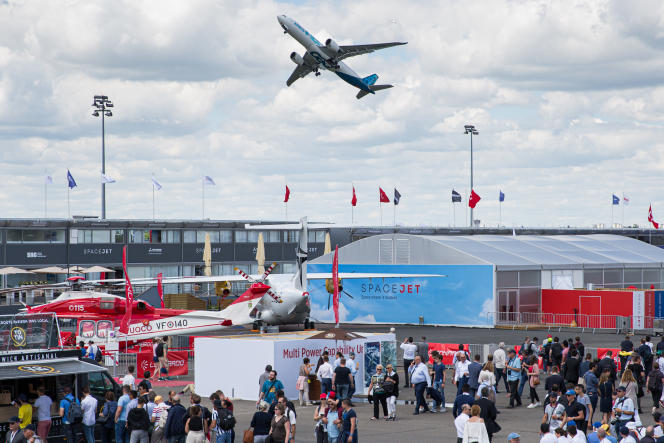Iat 54e edition of the International Aeronautics and Space Show, which is being held at Le Bourget from June 19 to 25, promises to be “an active market”, in the words of Airbus. This meeting of air and aeronautical actors traditionally takes place every two years, but the 2021 edition had been canceled due to the pandemic, this edition is a first for four years. This reunion should be the occasion for a rain of orders, according to the European aircraft manufacturer. The consulting firm AlixPartners even announces the return of giant contracts, these “megadeals”, as he calls them, which gave the “the” of the last shows before the crisis linked to Covid-19, in particular at Le Bourget, in June 2019. According to these experts, this is not even a rain but a deluge of orders which should delight the two main aircraft manufacturers, Airbus and Boeing.
At the end of the first half, the number of aircraft ordered, firm or to come, should be more than 2,000 copies, more than half of which are expected at the Paris Air Show alone. A figure that makes you dizzy to the point that some specialists are beginning to fear the formation of a bubble.
At Le Bourget, Turkish Airlines could even announce the largest order in the history of civil aviation, i.e. 600 planes: 400 medium-haul Airbus A320 or Boeing 737 MAX and 200 long-haul Airbus A350 or Boeing 787 or 777. The Indian company Indigo should also animate the market with an expected purchase of 500 medium-haul A320 family and 25 long-haul Airbus A350. A giant order which follows that announced a few months ago by the Air India company (470 aircraft in total, distributed almost evenly between the two aircraft manufacturers). Faced with the influx of orders, Airbus and Boeing must increase production rates without breaking the chain of subcontractors to serve customer companies as quickly as possible. Because they must increasingly arm themselves with patience. Aircraft deliveries are now staggered until the middle of the next decade.
Produce sustainable fuels
If manufacturers continue to have their eyes riveted on order books and production rates, Le Bourget intends to assert itself as the first show placed under the sign of decarbonization. The International Air Transport Association, which brings together 300 companies representing 83% of global air traffic, is committed to eliminating net CO2 emissions2 by 2050. This notably involves the incorporation of fuels of non-fossil origin, the famous sustainable aviation fuel (SAF), in aircraft fuel tanks. They will allow 65% of the reductions necessary to achieve this objective. But this fuel is expensive, six to seven times more than kerosene and today almost impossible to find.
You have 30.52% of this article left to read. The following is for subscribers only.
